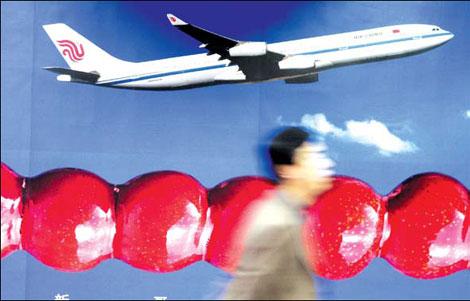
The European Commission concluded on June 17 that the new joint venture between Air China and Cathay Pacific, would not significantly impede effective competition in the European Economic Area. [Wu Changqing / For China Daily]
SOEs urged to enhance awareness of legal affairs and lawsuit procedures overseasBEIJING - The European Commission has cleared the way under the European Union (EU) Merger Regulation for the acquisition of a stake in Air China Cargo, a wholly-owned subsidiary of Air China, by Hong Kong-based Cathay Pacific Airways.
On May 10, the commission announced having received a notification of the proposed joint venture (JV) pursuant to the EU antitrust laws and launched an antitrust examination.
The commission concluded on June 17 that the acquisition would not significantly impede effective competition in the European Economic Area (EEA) - which includes the entire EU, Iceland, Liechtenstein and Norway - or any substantial part of it.
Although the examination results indicated that the commission concluded that the transaction would not raise competition concerns and granted regulatory clearance for the EEA market, the case still has great implications and a far-reaching impact on Chinese enterprises, and in particular State-owned enterprises (SOEs).
The case has attracted worldwide attention since the European Commission announced its decision.
Adrian Emch, a Beijing-based counsel and experienced antitrust lawyer at one of the world's leading law firms, Hogan Lovells, told China Daily: "This case is not too complicated, but it is one of the very first cases to involve an SOE (Air China) in an EU antitrust investigation."
In another aspect, it is also the first case where two Chinese enterprises' JV, has been subject to examination by the EU commission, the lawyer noted. 
In 2004, the acquisition by the Chinese private enterprise TCL of 100 percent of the France-based Alcatel Mobile Phone Division received antitrust clearance by the EU commission.
In 2007, Huawei was also examined by the commission for the establishment of a JV with US-based Symantec.
After these investigations, the commission decided not to oppose TCL's and Huawei's notified operations and declared them compatible with the EU common market.
"The Air China Cargo case hopefully inspires Chinese SOEs to increase their antitrust know-how and rethink their working methods in legal affairs, particularly for their mergers and acquisitions," Emch said.
He advises Chinese SOEs to take a global perspective in their moves to establish JVs.
More importantly, SOEs should not only focus on the JVs set up between an SOE and a foreign party, but also on the JVs founded between two Chinese companies, he said.
He suggested that Chinese enterprises make in-depth analyses to decide whether to report their JVs to overseas competition authorities.
Emch urged Chinese SOEs to raise their awareness of legal affairs and lawsuit procedures overseas, to detect possible risks and prevent unnecessary financial losses.
"Avoiding law suits is very beneficial for enterprises," he said. "Any involvement in a lawsuit, even if ultimately successful, will cause an enterprise to inject funds in preparing documents or having agents involved until the final settlement," he said.
A well-prepared effort including a complete analysis whether their move will impede overseas market competition and harm consumers and a decision on whether to report the case abroad are critically needed and worthwhile for SOEs, the counsel said.
The lawyer also advised Chinese SOEs to undertake in-depth studies of antitrust laws in different countries, which have different policies and regulations.
Currently, the top headache for Chinese SOEs in their overseas lawsuits is that they are worried about a potential leakage of national secrets.
Emch stressed that they should not have unnecessary concerns and learn to trust foreign competition authorities.
'Go overseas' campaign
China has launched a campaign to encourage more SOEs to "go overseas" since 2003.
Many leading Chinese SOEs have stepped up their efforts, such as Sinosteel, Sinopec, CNPC and Chinalco, in the field of mergers and acquisitions, and investment.
China also revealed an ambitious target to cut the size of its existing 132 SOEs to 80-100 by the end of 2010. All those moves will lead to legal risks.
Hogan Lovells, which has many top SOE clients in key industries in China, advises market leaders to take a prudent approach in dealing with their international businesses.
In another development, the State-owned Assets Supervision and Administration Commission launched a three-year campaign to enhance the legal affairs management of SOEs in 2009.
The main focus is to address SOEs' flaws in legal affairs and minimize risks in international business.





